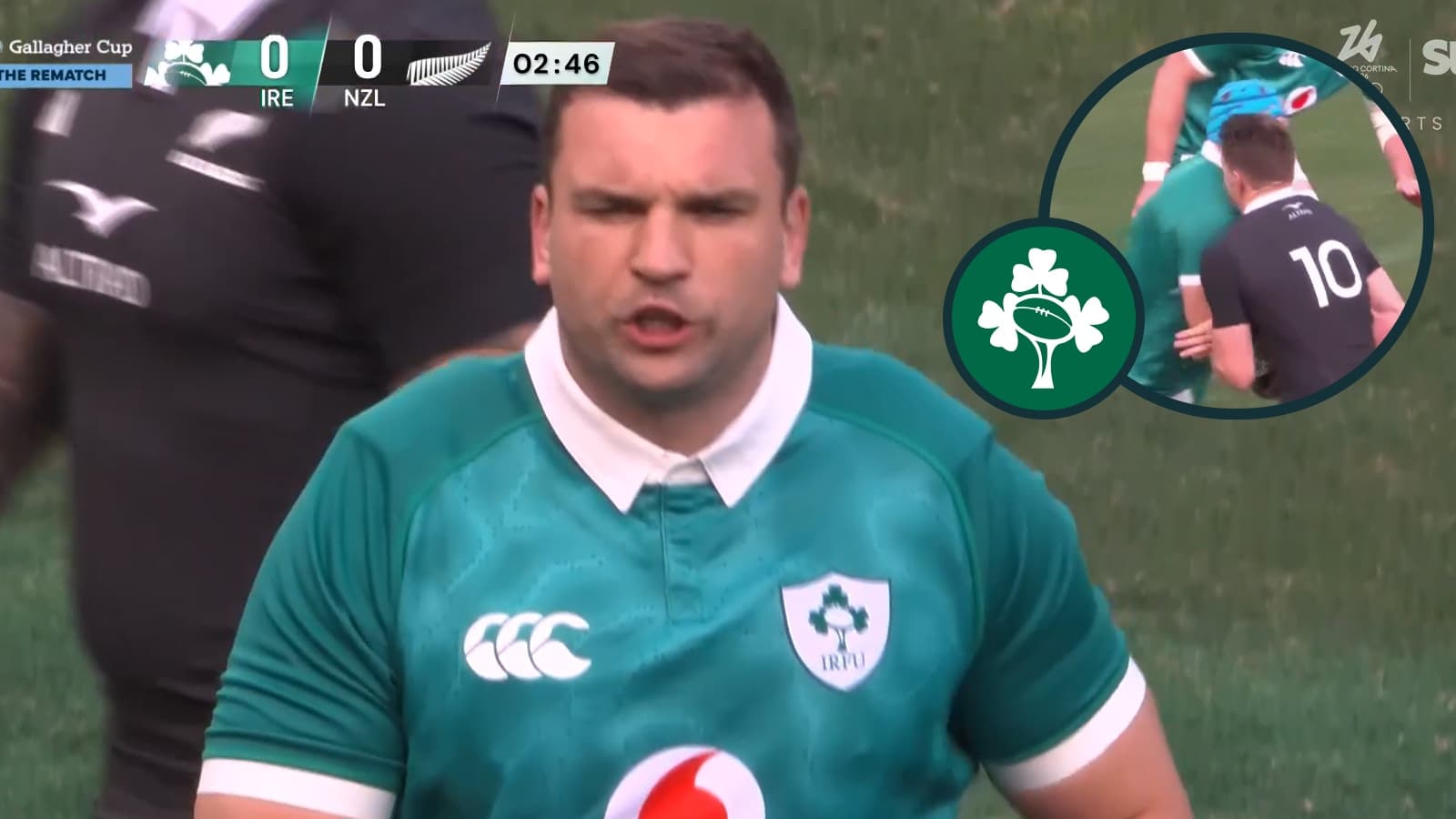Former Test match official and director of referees at Irish Rugby, Owen Doyle, has slammed the decision to red card Tadhg Beirne in the clash against the All Blacks.
The Irish second-rower was shown a yellow card early on in the clash at Soldier Field in Chicago after a collision with New Zealand fly-half Beauden Barrett.
After a lengthy delay due to technical issues, referee Pierre Brousset issued the yellow card to Beirne and sent the incident to be reviewed by the Foul Play Review Officer [FPRO].
Many fans and pundits argue that even a yellow card was a harsh call, a viewpoint that Doyle agrees with; like most, he deemed the collision to be accidental, with Barrett caught unawares as Cameron Roigard threw a forward pass to the playmaker who was running a decoy line. Beirne had shot up in defence and hardly had time to adjust as he braced for contact, but did make a high hit on the New Zealander.
“Tadhg Beirne’s yellow to a red card was wrong – plain and simple”
The former referee boss believes that even a yellow card was harsh.
“If it did [meet the yellow card threshold], it was a lighter shade of pale and the bunker should have left it at that level,” he wrote in his latest Irish Times column.
FPRO Dan Jones would upgrade the yellow card to a 20-minute red card, and Doyle believes that it has highlighted an issue with the quality of the international match officials and World Rugby’s bunker system.
The FPRO process was introduced before the 2023 Rugby World Cup, and was added in an attempt to speed up the decision-making process with a second, off-site TMO, given eight minutes to review an incident to deem whether a yellow card is sufficient or if it meets the red card threshold.
“His [the FPRO] upgrading of Tadhg Beirne’s yellow to a red card was wrong – plain and simple,” Doyle remarked.
Adding: “What I saw was an accident. Beauden Barrett has been admirably quick to say he wasn’t expecting the ball – and, no doubt, Beirne wasn’t expecting him to have it. Imagine, for a moment, Beirne was the ball carrier. Does that mean a red for Barrett? Like heck it does.
“The collision was at the lower end of force and, given all the circumstances, the red card should be struck out, expunged from the Irish player’s record.
All Blacks great slams Tadhg Beirne’s ‘absolute joke’ red card and issues warning to World Rugby
“There is a growing tendency for referees to behave like Pontius Pilate, washing their hands of foul play, leaving the tricky calls to be made elsewhere. Often, it’s as if they haven’t seen stuff that is clearly dangerous; they wait for the TMO to tell them before whistling. If the TMO fails to come in, then it’s play on.”
The former international referee adds that Jones’ incorrect call puts a question mark over the ‘whole process’ that World Rugby has introduced.
Particularly because the least senior match official appointed to oversee the game was the one tasked with making the most high-profile decision.
Junior partner made the high-profile call
However, Doyle admits it’s not entirely their fault as so many officials fall into the category of having little or no zero experience at the highest level.
He suggests the answer might be binning the entire bunker protocol and entrusting the TMO to handle it instead, perhaps with an assistant.
“This critical decision was made by the junior partner in the team of five officials. That in itself is bizarre and puts a solid question mark over the whole process,” he wrote.
“Jones was clearly incorrect in terming Beirne’s action as having a ‘high degree of danger’. Once he arrived at that conclusion, the outlook was inevitably grim.
“There is, though, a wider problem. I am referring to an insufficient depth of quality in the match officials chart. Because of this, it’s hard to avoid appointing some officials who have little or no zero experience of international rugby. A number of officials fall into this category and while they are doing their best, it’s high risk.
“Perhaps the answer is to bin the bunker and hand these decisions to the TMO. He would simply need an assistant to follow play, while the TMO studies the dangerous offence.”
Doyle concludes that while he has been against the introduction of the 20-minute red card, he is happy to concede that it is necessary if “we’re going to see more of this nonsense.”

